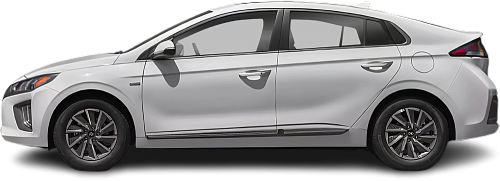Global EV Comparison: Hyundai Ioniq Electric Gen 2 vs Peugeot e-208 50 kWh
Struggling to Decide? Let AI Help!
Your AI Summary Is Ready!
General Info
Since both vehicles have been discontinued, they are now only available on the used car market. You can get the Hyundai Ioniq Electric Gen 2 (2019-2022) for as low as €14900, while the Peugeot e-208 50 kWh (2021-2023) begins at €14990.
The Hyundai Ioniq Electric Gen 2 (2019-2022) is a Liftback, whereas the Peugeot e-208 50 kWh (2021-2023) is a Hatchback.
| Property | Hyundai Ioniq Electric Gen 2 | Peugeot e-208 50 kWh |
|---|---|---|
| Years of Production | 2019-2022 | 2021-2023 |
| Current Status | Discontinued | Discontinued |
| Country of Manufacture | South Korea | Slovakia |
| Body Style | Liftback | Hatchback |
| Market Availability | EU, USA | EU |
| Price Europe (Used) | €14900 | €14990 |
| GCC Score | 5 | 5 |
Range and Efficiency
While the Peugeot e-208 50 kWh (2021-2023) offers a longer real-world range and a bigger battery, it is less energy-efficient than the Hyundai Ioniq Electric Gen 2 (2019-2022).
| Property | Hyundai Ioniq Electric Gen 2 | Peugeot e-208 50 kWh |
|---|---|---|
| Range (EPA) | 274 km | - Range (EPA) |
| Range (WLTP) | 311 km | 362 km |
| Range (GCC) | 262 km | 311 km |
| Battery Capacity (Nominal) | 40.4 kWh | 50 kWh |
| Battery Capacity (Usable) | 38.3 kWh | 46.3 kWh |
| Efficiency per 100 km | 14.6 kWh/100 km | 14.9 kWh/100 km |
| Efficiency per kWh | 6.84 km/kWh | 6.72 km/kWh |
| Range and Efficiency Score | 6.4 | 6.8 |
Charging
Both vehicles utilize a standard 400-volt architecture.
The Peugeot e-208 50 kWh (2021-2023) offers faster charging speeds at DC stations, reaching up to 101 kW, while the Hyundai Ioniq Electric Gen 2 (2019-2022) maxes out at 44 kW.
The Peugeot e-208 50 kWh (2021-2023) features a more powerful on-board charger, supporting a maximum AC charging power of 7.4 kW, whereas the Hyundai Ioniq Electric Gen 2 (2019-2022) is limited to 7.2 kW.
| Property | Hyundai Ioniq Electric Gen 2 | Peugeot e-208 50 kWh |
|---|---|---|
| Max Charging Power (AC) | 7.2 kW | 7.4 kW |
| Max Charging Power (DC) | 44 kW | 101 kW |
| Architecture | 400 V | 400 V |
| Charge Port | CCS Type 2 | CCS Type 2 |
| Charging Score | 3.9 | 4.3 |
Performance
Both vehicles are front-wheel drive.
Both cars offer the same motor power, but the Peugeot e-208 50 kWh (2021-2023) achieves a faster 0-100 km/h time.
| Property | Hyundai Ioniq Electric Gen 2 | Peugeot e-208 50 kWh |
|---|---|---|
| Drive Type | FWD | FWD |
| Motor Type | PMSM | PMSM |
| Motor Power (kW) | 100 kW | 100 kW |
| Motor Power (hp) | 134 hp | 134 hp |
| Motor Torque | 295 Nm | 260 Nm |
| 0-100 km/h | 9.7 s | 9 s |
| Top Speed | 165 km/h | 150 km/h |
| Performance Score | 2.9 | 2.8 |
Dimensions
The Hyundai Ioniq Electric Gen 2 (2019-2022) is longer and wider, but about the same height as the Peugeot e-208 50 kWh (2021-2023).
The Hyundai Ioniq Electric Gen 2 (2019-2022) boasts a more extended wheelbase.
| Property | Hyundai Ioniq Electric Gen 2 | Peugeot e-208 50 kWh |
|---|---|---|
| Length | 4470 mm | 4055 mm |
| Width (with Mirrors) | 2045 mm | 1960 mm |
| Width (w/o Mirrors) | 1820 mm | 1765 mm |
| Height | 1450 mm | 1430 mm |
| Wheelbase | 2700 mm | 2540 mm |
Cargo and Towing
The Hyundai Ioniq Electric Gen 2 (2019-2022) provides more cargo capacity, featuring both a larger trunk and more space with the rear seats folded.
Neither car is equipped with a frunk (front trunk).
Neither vehicle is officially rated for towing in in the EU.
| Property | Hyundai Ioniq Electric Gen 2 | Peugeot e-208 50 kWh |
|---|---|---|
| Number of Seats | 5 | 5 |
| Curb Weight | 1602 kg | 1530 kg |
| Cargo Volume (Trunk) | 357 l | 265 l |
| Cargo Volume (Max) | 1417 l | 1106 l |
| Cargo Volume (Frunk) | - Cargo Volume (Frunk) | - Cargo Volume (Frunk) |
| Towing Capacity | - Towing Capacity | - Towing Capacity |
| Cargo and Towing Score | 4.1 | 3.5 |




